Quality Managers of EasyJet: Report on Service Quality and Improvement
VerifiedAdded on 2020/11/12
|11
|3111
|483
Report
AI Summary
This report provides an in-depth analysis of EasyJet's quality management practices within the context of the UK airline industry. It begins with an executive summary highlighting the challenges EasyJet faces, including low customer satisfaction and operational inefficiencies. The introduction defines the role of quality managers and their functions within an organization, using EasyJet as a case study. The main body delves into the specific problems EasyJet experiences, such as issues with reliability, assurance, tangible elements, empathy, and responsiveness. It then identifies EasyJet's competencies, including low cost, minimal waiting times, and direct routes, and discusses how these can be leveraged to improve service quality. The report also examines the impact of benchmarking as a technique for ensuring consistent and effective quality management, focusing on internal benchmarking. The conclusion summarizes the key findings and offers recommendations for EasyJet to enhance its service quality and regain customer trust. The report also covers the importance of abilities and competencies of EasyJet to improve the quality and the impact of benchmarking technique on EasyJet in delivering consistent and effective quality management.
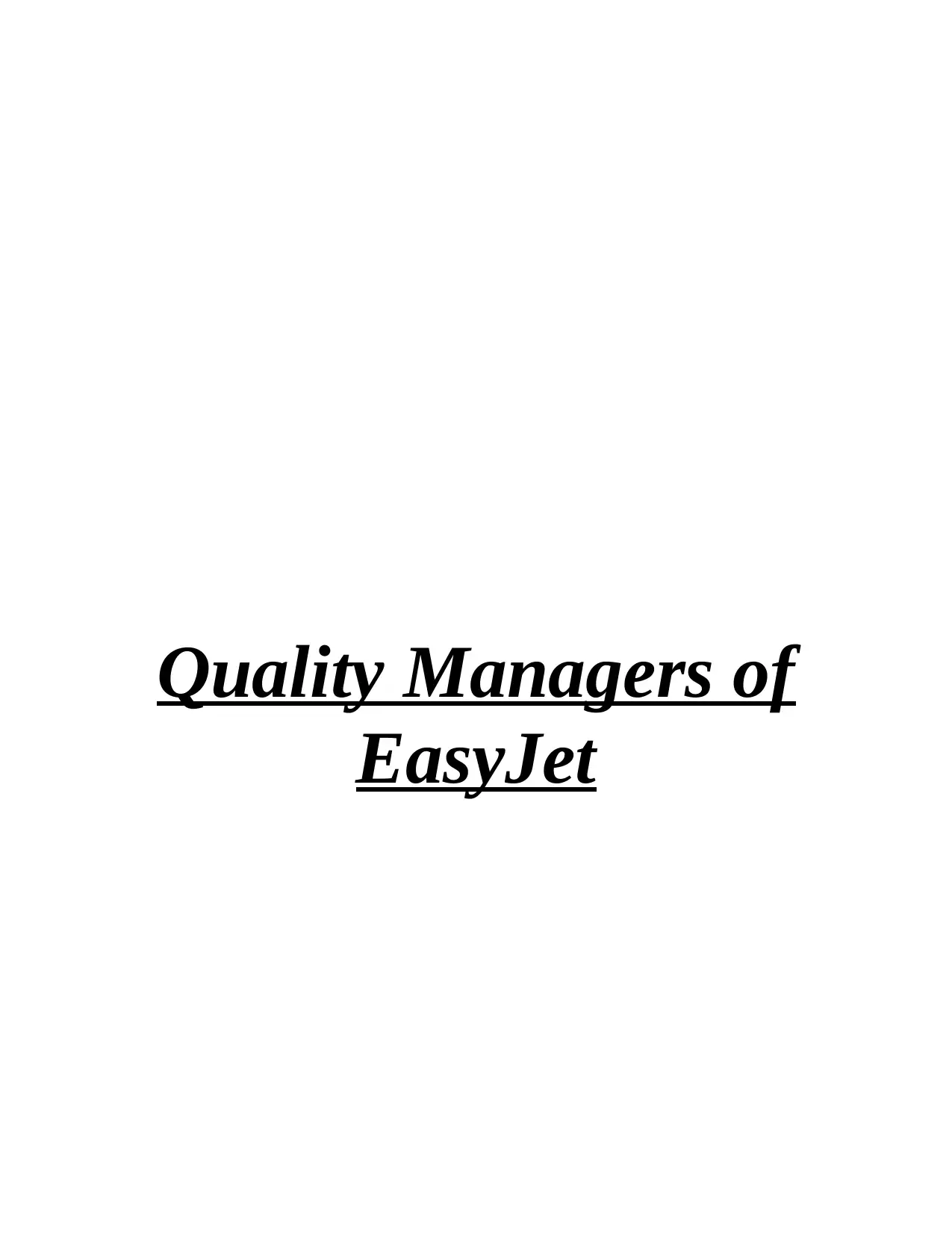
Quality Managers of
EasyJet
EasyJet
Paraphrase This Document
Need a fresh take? Get an instant paraphrase of this document with our AI Paraphraser
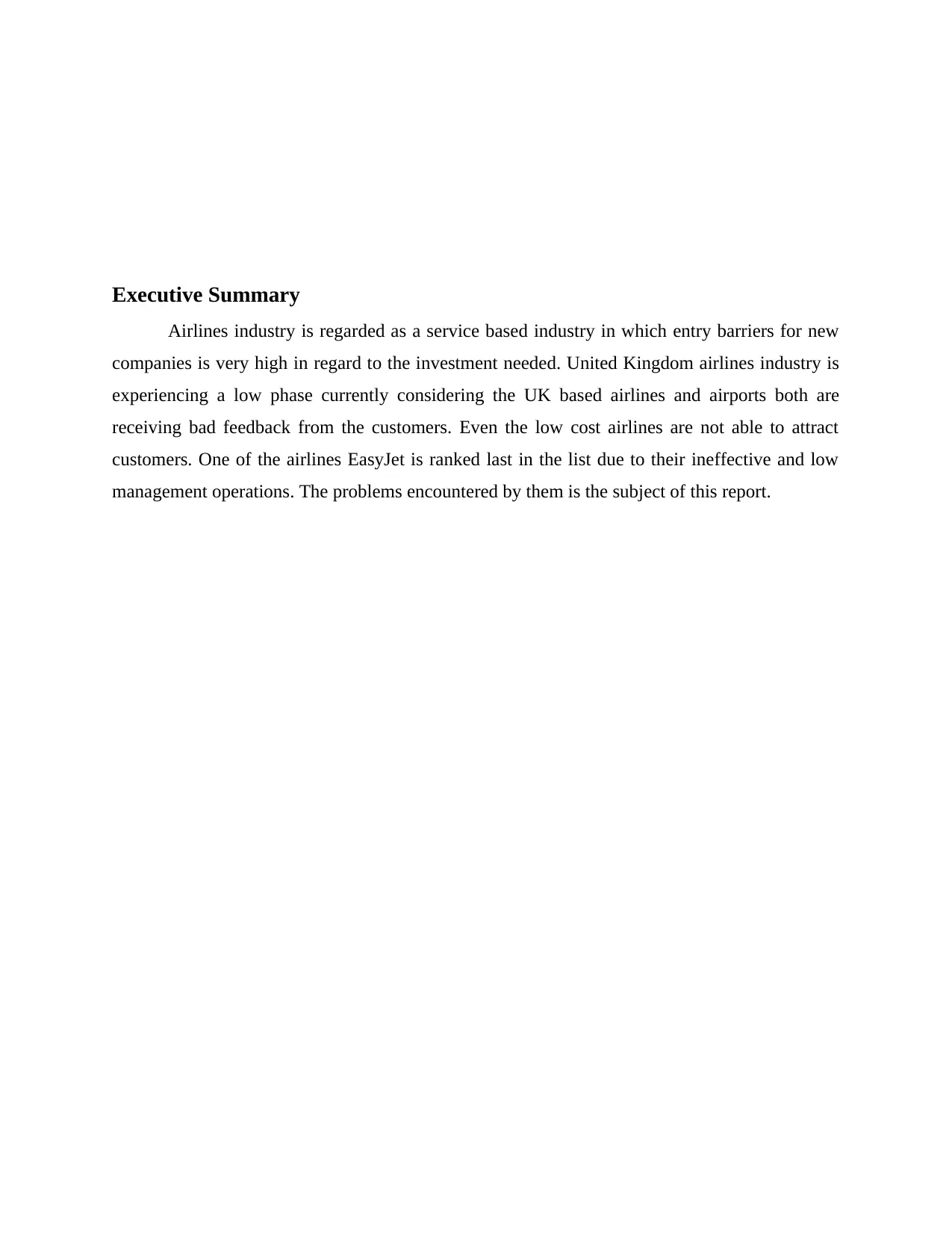
Executive Summary
Airlines industry is regarded as a service based industry in which entry barriers for new
companies is very high in regard to the investment needed. United Kingdom airlines industry is
experiencing a low phase currently considering the UK based airlines and airports both are
receiving bad feedback from the customers. Even the low cost airlines are not able to attract
customers. One of the airlines EasyJet is ranked last in the list due to their ineffective and low
management operations. The problems encountered by them is the subject of this report.
Airlines industry is regarded as a service based industry in which entry barriers for new
companies is very high in regard to the investment needed. United Kingdom airlines industry is
experiencing a low phase currently considering the UK based airlines and airports both are
receiving bad feedback from the customers. Even the low cost airlines are not able to attract
customers. One of the airlines EasyJet is ranked last in the list due to their ineffective and low
management operations. The problems encountered by them is the subject of this report.
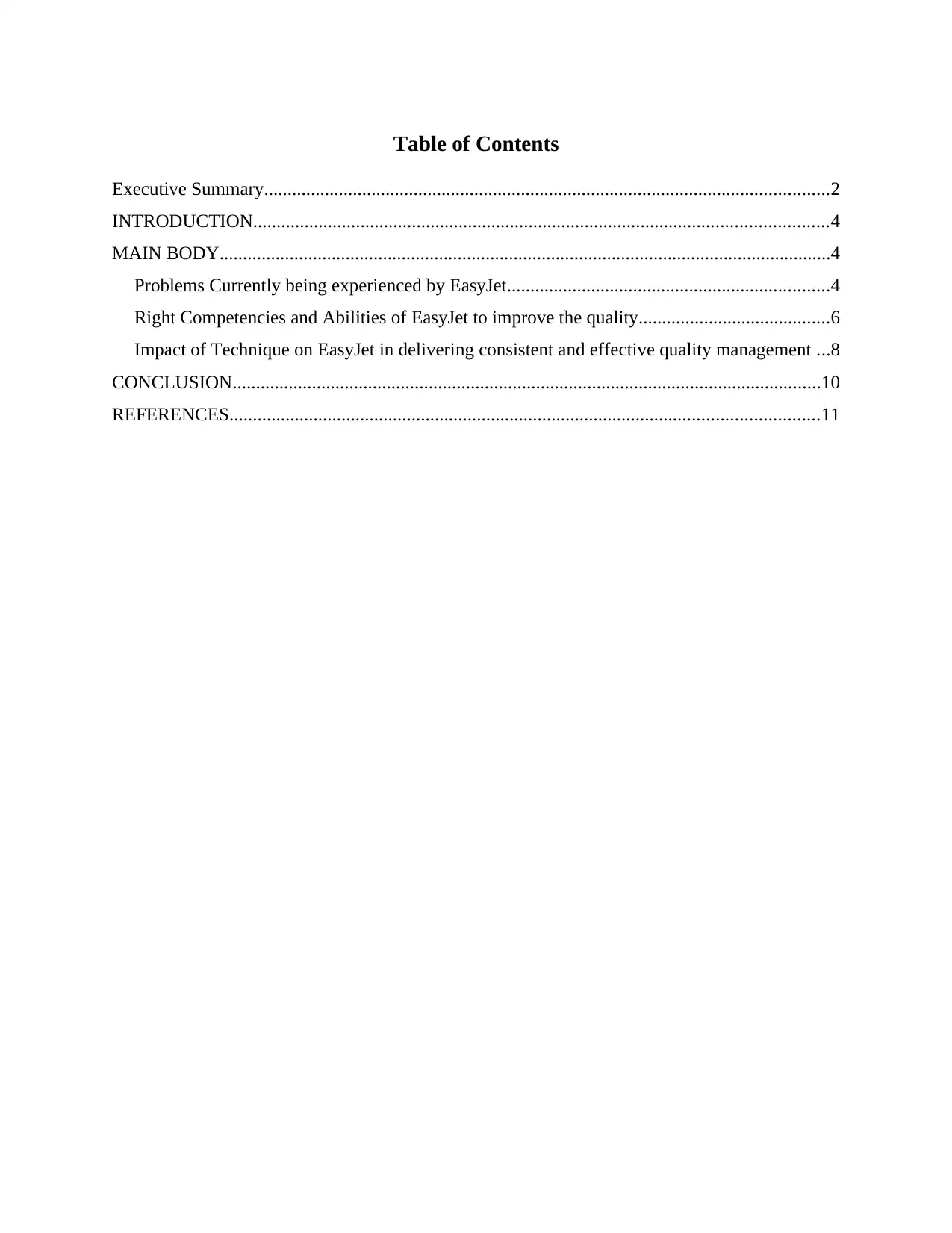
Table of Contents
Executive Summary.........................................................................................................................2
INTRODUCTION...........................................................................................................................4
MAIN BODY...................................................................................................................................4
Problems Currently being experienced by EasyJet.....................................................................4
Right Competencies and Abilities of EasyJet to improve the quality.........................................6
Impact of Technique on EasyJet in delivering consistent and effective quality management ...8
CONCLUSION..............................................................................................................................10
REFERENCES..............................................................................................................................11
Executive Summary.........................................................................................................................2
INTRODUCTION...........................................................................................................................4
MAIN BODY...................................................................................................................................4
Problems Currently being experienced by EasyJet.....................................................................4
Right Competencies and Abilities of EasyJet to improve the quality.........................................6
Impact of Technique on EasyJet in delivering consistent and effective quality management ...8
CONCLUSION..............................................................................................................................10
REFERENCES..............................................................................................................................11
⊘ This is a preview!⊘
Do you want full access?
Subscribe today to unlock all pages.

Trusted by 1+ million students worldwide
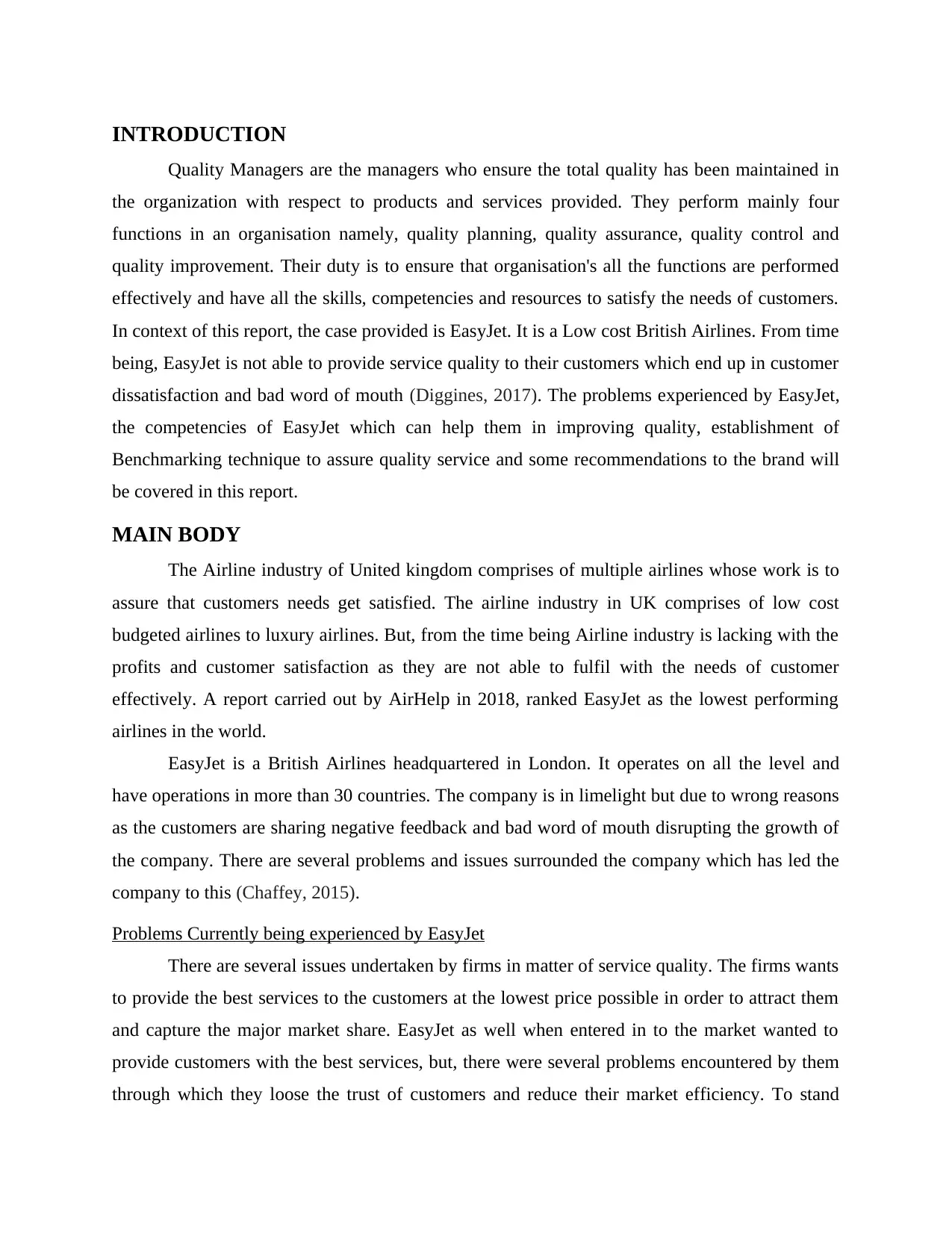
INTRODUCTION
Quality Managers are the managers who ensure the total quality has been maintained in
the organization with respect to products and services provided. They perform mainly four
functions in an organisation namely, quality planning, quality assurance, quality control and
quality improvement. Their duty is to ensure that organisation's all the functions are performed
effectively and have all the skills, competencies and resources to satisfy the needs of customers.
In context of this report, the case provided is EasyJet. It is a Low cost British Airlines. From time
being, EasyJet is not able to provide service quality to their customers which end up in customer
dissatisfaction and bad word of mouth (Diggines, 2017). The problems experienced by EasyJet,
the competencies of EasyJet which can help them in improving quality, establishment of
Benchmarking technique to assure quality service and some recommendations to the brand will
be covered in this report.
MAIN BODY
The Airline industry of United kingdom comprises of multiple airlines whose work is to
assure that customers needs get satisfied. The airline industry in UK comprises of low cost
budgeted airlines to luxury airlines. But, from the time being Airline industry is lacking with the
profits and customer satisfaction as they are not able to fulfil with the needs of customer
effectively. A report carried out by AirHelp in 2018, ranked EasyJet as the lowest performing
airlines in the world.
EasyJet is a British Airlines headquartered in London. It operates on all the level and
have operations in more than 30 countries. The company is in limelight but due to wrong reasons
as the customers are sharing negative feedback and bad word of mouth disrupting the growth of
the company. There are several problems and issues surrounded the company which has led the
company to this (Chaffey, 2015).
Problems Currently being experienced by EasyJet
There are several issues undertaken by firms in matter of service quality. The firms wants
to provide the best services to the customers at the lowest price possible in order to attract them
and capture the major market share. EasyJet as well when entered in to the market wanted to
provide customers with the best services, but, there were several problems encountered by them
through which they loose the trust of customers and reduce their market efficiency. To stand
Quality Managers are the managers who ensure the total quality has been maintained in
the organization with respect to products and services provided. They perform mainly four
functions in an organisation namely, quality planning, quality assurance, quality control and
quality improvement. Their duty is to ensure that organisation's all the functions are performed
effectively and have all the skills, competencies and resources to satisfy the needs of customers.
In context of this report, the case provided is EasyJet. It is a Low cost British Airlines. From time
being, EasyJet is not able to provide service quality to their customers which end up in customer
dissatisfaction and bad word of mouth (Diggines, 2017). The problems experienced by EasyJet,
the competencies of EasyJet which can help them in improving quality, establishment of
Benchmarking technique to assure quality service and some recommendations to the brand will
be covered in this report.
MAIN BODY
The Airline industry of United kingdom comprises of multiple airlines whose work is to
assure that customers needs get satisfied. The airline industry in UK comprises of low cost
budgeted airlines to luxury airlines. But, from the time being Airline industry is lacking with the
profits and customer satisfaction as they are not able to fulfil with the needs of customer
effectively. A report carried out by AirHelp in 2018, ranked EasyJet as the lowest performing
airlines in the world.
EasyJet is a British Airlines headquartered in London. It operates on all the level and
have operations in more than 30 countries. The company is in limelight but due to wrong reasons
as the customers are sharing negative feedback and bad word of mouth disrupting the growth of
the company. There are several problems and issues surrounded the company which has led the
company to this (Chaffey, 2015).
Problems Currently being experienced by EasyJet
There are several issues undertaken by firms in matter of service quality. The firms wants
to provide the best services to the customers at the lowest price possible in order to attract them
and capture the major market share. EasyJet as well when entered in to the market wanted to
provide customers with the best services, but, there were several problems encountered by them
through which they loose the trust of customers and reduce their market efficiency. To stand
Paraphrase This Document
Need a fresh take? Get an instant paraphrase of this document with our AI Paraphraser
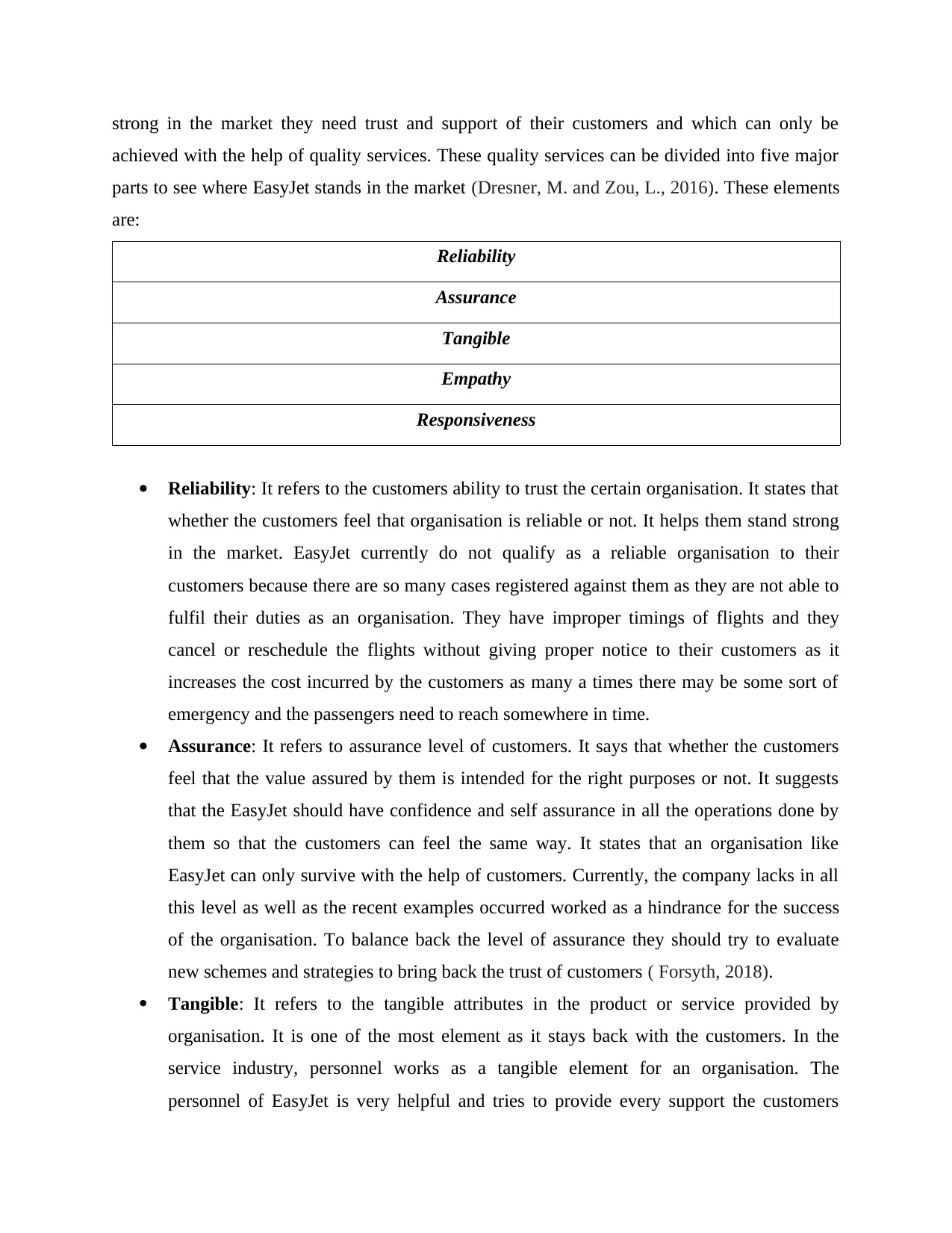
strong in the market they need trust and support of their customers and which can only be
achieved with the help of quality services. These quality services can be divided into five major
parts to see where EasyJet stands in the market (Dresner, M. and Zou, L., 2016). These elements
are:
Reliability
Assurance
Tangible
Empathy
Responsiveness
Reliability: It refers to the customers ability to trust the certain organisation. It states that
whether the customers feel that organisation is reliable or not. It helps them stand strong
in the market. EasyJet currently do not qualify as a reliable organisation to their
customers because there are so many cases registered against them as they are not able to
fulfil their duties as an organisation. They have improper timings of flights and they
cancel or reschedule the flights without giving proper notice to their customers as it
increases the cost incurred by the customers as many a times there may be some sort of
emergency and the passengers need to reach somewhere in time.
Assurance: It refers to assurance level of customers. It says that whether the customers
feel that the value assured by them is intended for the right purposes or not. It suggests
that the EasyJet should have confidence and self assurance in all the operations done by
them so that the customers can feel the same way. It states that an organisation like
EasyJet can only survive with the help of customers. Currently, the company lacks in all
this level as well as the recent examples occurred worked as a hindrance for the success
of the organisation. To balance back the level of assurance they should try to evaluate
new schemes and strategies to bring back the trust of customers ( Forsyth, 2018).
Tangible: It refers to the tangible attributes in the product or service provided by
organisation. It is one of the most element as it stays back with the customers. In the
service industry, personnel works as a tangible element for an organisation. The
personnel of EasyJet is very helpful and tries to provide every support the customers
achieved with the help of quality services. These quality services can be divided into five major
parts to see where EasyJet stands in the market (Dresner, M. and Zou, L., 2016). These elements
are:
Reliability
Assurance
Tangible
Empathy
Responsiveness
Reliability: It refers to the customers ability to trust the certain organisation. It states that
whether the customers feel that organisation is reliable or not. It helps them stand strong
in the market. EasyJet currently do not qualify as a reliable organisation to their
customers because there are so many cases registered against them as they are not able to
fulfil their duties as an organisation. They have improper timings of flights and they
cancel or reschedule the flights without giving proper notice to their customers as it
increases the cost incurred by the customers as many a times there may be some sort of
emergency and the passengers need to reach somewhere in time.
Assurance: It refers to assurance level of customers. It says that whether the customers
feel that the value assured by them is intended for the right purposes or not. It suggests
that the EasyJet should have confidence and self assurance in all the operations done by
them so that the customers can feel the same way. It states that an organisation like
EasyJet can only survive with the help of customers. Currently, the company lacks in all
this level as well as the recent examples occurred worked as a hindrance for the success
of the organisation. To balance back the level of assurance they should try to evaluate
new schemes and strategies to bring back the trust of customers ( Forsyth, 2018).
Tangible: It refers to the tangible attributes in the product or service provided by
organisation. It is one of the most element as it stays back with the customers. In the
service industry, personnel works as a tangible element for an organisation. The
personnel of EasyJet is very helpful and tries to provide every support the customers
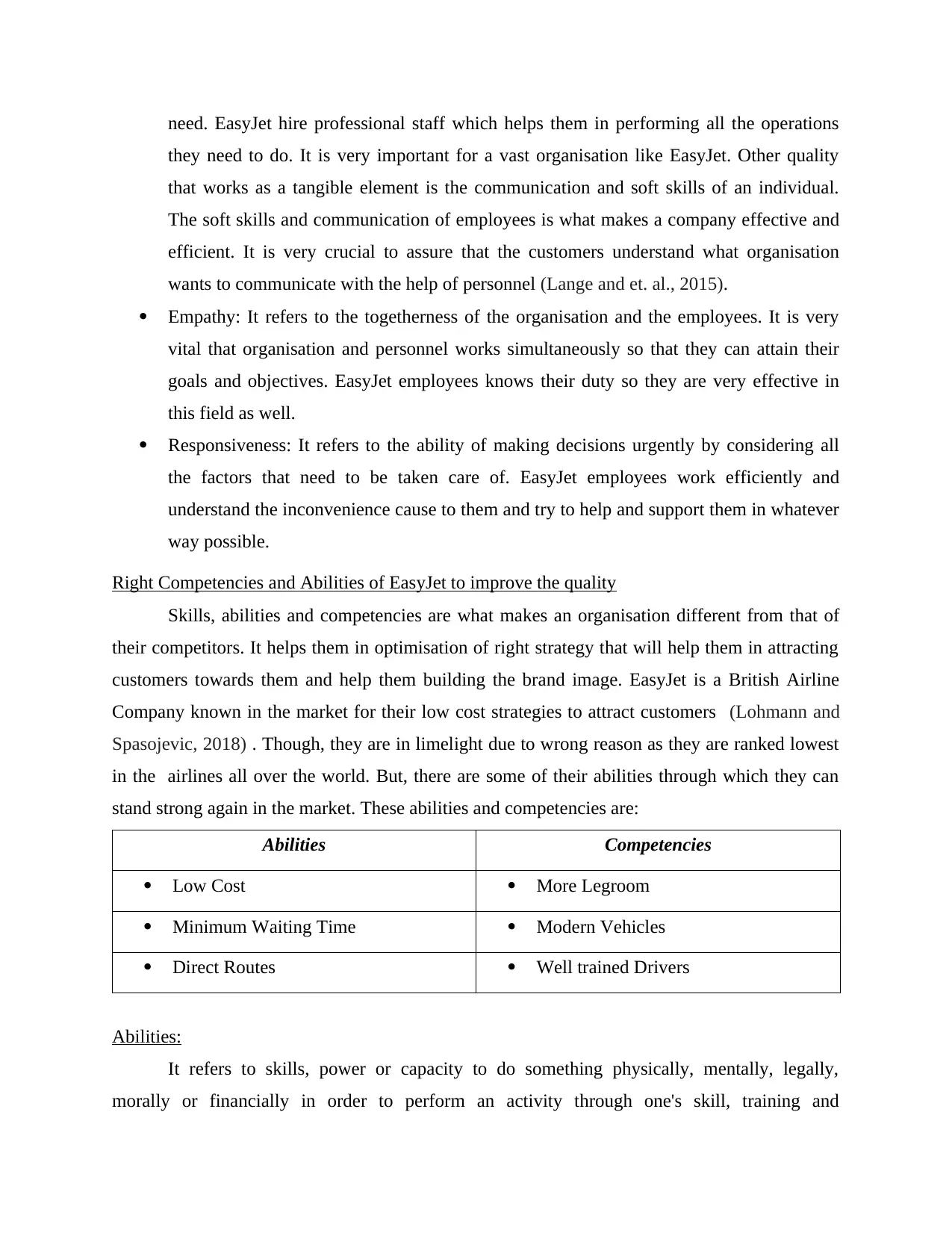
need. EasyJet hire professional staff which helps them in performing all the operations
they need to do. It is very important for a vast organisation like EasyJet. Other quality
that works as a tangible element is the communication and soft skills of an individual.
The soft skills and communication of employees is what makes a company effective and
efficient. It is very crucial to assure that the customers understand what organisation
wants to communicate with the help of personnel (Lange and et. al., 2015).
Empathy: It refers to the togetherness of the organisation and the employees. It is very
vital that organisation and personnel works simultaneously so that they can attain their
goals and objectives. EasyJet employees knows their duty so they are very effective in
this field as well.
Responsiveness: It refers to the ability of making decisions urgently by considering all
the factors that need to be taken care of. EasyJet employees work efficiently and
understand the inconvenience cause to them and try to help and support them in whatever
way possible.
Right Competencies and Abilities of EasyJet to improve the quality
Skills, abilities and competencies are what makes an organisation different from that of
their competitors. It helps them in optimisation of right strategy that will help them in attracting
customers towards them and help them building the brand image. EasyJet is a British Airline
Company known in the market for their low cost strategies to attract customers (Lohmann and
Spasojevic, 2018) . Though, they are in limelight due to wrong reason as they are ranked lowest
in the airlines all over the world. But, there are some of their abilities through which they can
stand strong again in the market. These abilities and competencies are:
Abilities Competencies
Low Cost More Legroom
Minimum Waiting Time Modern Vehicles
Direct Routes Well trained Drivers
Abilities:
It refers to skills, power or capacity to do something physically, mentally, legally,
morally or financially in order to perform an activity through one's skill, training and
they need to do. It is very important for a vast organisation like EasyJet. Other quality
that works as a tangible element is the communication and soft skills of an individual.
The soft skills and communication of employees is what makes a company effective and
efficient. It is very crucial to assure that the customers understand what organisation
wants to communicate with the help of personnel (Lange and et. al., 2015).
Empathy: It refers to the togetherness of the organisation and the employees. It is very
vital that organisation and personnel works simultaneously so that they can attain their
goals and objectives. EasyJet employees knows their duty so they are very effective in
this field as well.
Responsiveness: It refers to the ability of making decisions urgently by considering all
the factors that need to be taken care of. EasyJet employees work efficiently and
understand the inconvenience cause to them and try to help and support them in whatever
way possible.
Right Competencies and Abilities of EasyJet to improve the quality
Skills, abilities and competencies are what makes an organisation different from that of
their competitors. It helps them in optimisation of right strategy that will help them in attracting
customers towards them and help them building the brand image. EasyJet is a British Airline
Company known in the market for their low cost strategies to attract customers (Lohmann and
Spasojevic, 2018) . Though, they are in limelight due to wrong reason as they are ranked lowest
in the airlines all over the world. But, there are some of their abilities through which they can
stand strong again in the market. These abilities and competencies are:
Abilities Competencies
Low Cost More Legroom
Minimum Waiting Time Modern Vehicles
Direct Routes Well trained Drivers
Abilities:
It refers to skills, power or capacity to do something physically, mentally, legally,
morally or financially in order to perform an activity through one's skill, training and
⊘ This is a preview!⊘
Do you want full access?
Subscribe today to unlock all pages.

Trusted by 1+ million students worldwide
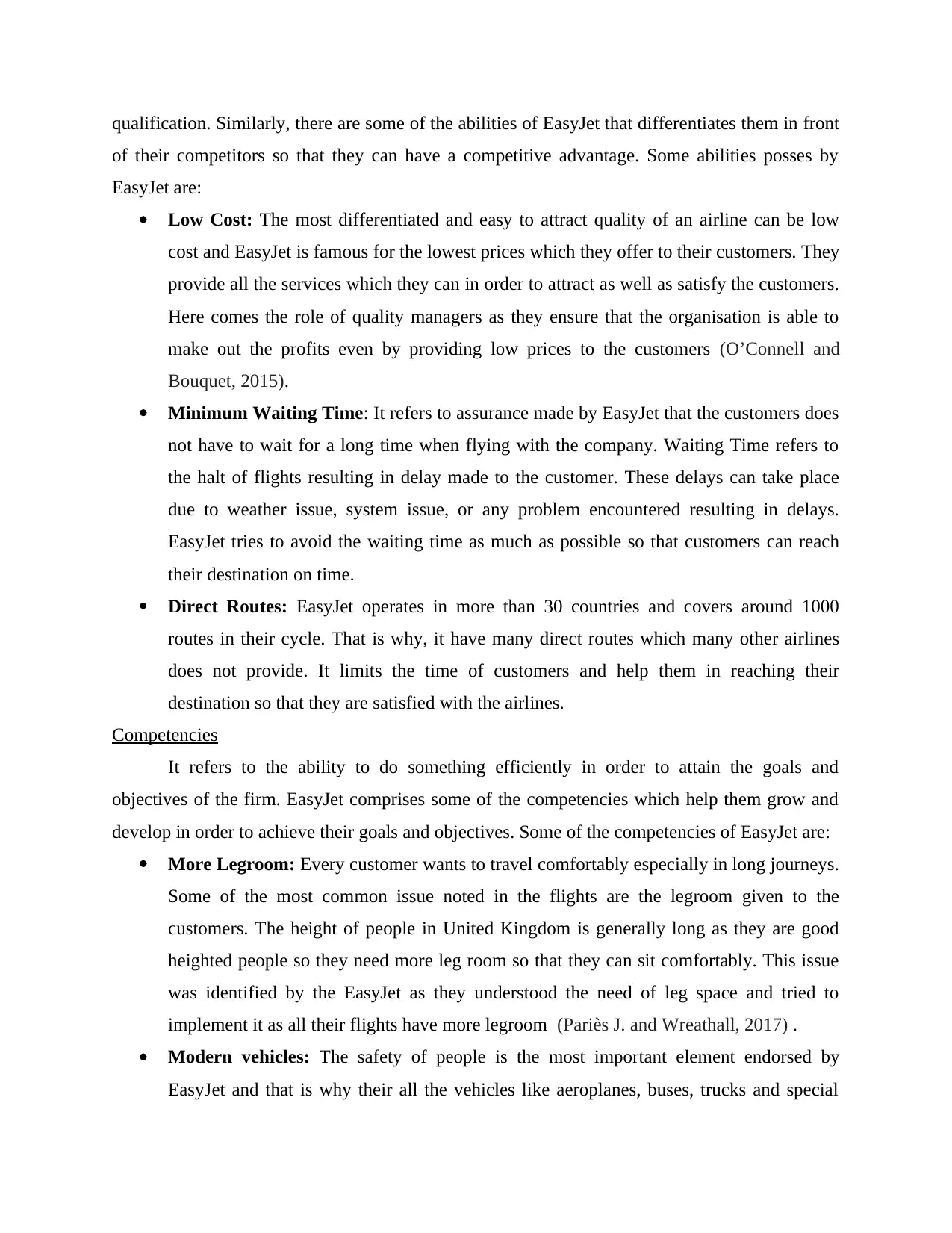
qualification. Similarly, there are some of the abilities of EasyJet that differentiates them in front
of their competitors so that they can have a competitive advantage. Some abilities posses by
EasyJet are:
Low Cost: The most differentiated and easy to attract quality of an airline can be low
cost and EasyJet is famous for the lowest prices which they offer to their customers. They
provide all the services which they can in order to attract as well as satisfy the customers.
Here comes the role of quality managers as they ensure that the organisation is able to
make out the profits even by providing low prices to the customers (O’Connell and
Bouquet, 2015).
Minimum Waiting Time: It refers to assurance made by EasyJet that the customers does
not have to wait for a long time when flying with the company. Waiting Time refers to
the halt of flights resulting in delay made to the customer. These delays can take place
due to weather issue, system issue, or any problem encountered resulting in delays.
EasyJet tries to avoid the waiting time as much as possible so that customers can reach
their destination on time.
Direct Routes: EasyJet operates in more than 30 countries and covers around 1000
routes in their cycle. That is why, it have many direct routes which many other airlines
does not provide. It limits the time of customers and help them in reaching their
destination so that they are satisfied with the airlines.
Competencies
It refers to the ability to do something efficiently in order to attain the goals and
objectives of the firm. EasyJet comprises some of the competencies which help them grow and
develop in order to achieve their goals and objectives. Some of the competencies of EasyJet are:
More Legroom: Every customer wants to travel comfortably especially in long journeys.
Some of the most common issue noted in the flights are the legroom given to the
customers. The height of people in United Kingdom is generally long as they are good
heighted people so they need more leg room so that they can sit comfortably. This issue
was identified by the EasyJet as they understood the need of leg space and tried to
implement it as all their flights have more legroom (Pariès J. and Wreathall, 2017) .
Modern vehicles: The safety of people is the most important element endorsed by
EasyJet and that is why their all the vehicles like aeroplanes, buses, trucks and special
of their competitors so that they can have a competitive advantage. Some abilities posses by
EasyJet are:
Low Cost: The most differentiated and easy to attract quality of an airline can be low
cost and EasyJet is famous for the lowest prices which they offer to their customers. They
provide all the services which they can in order to attract as well as satisfy the customers.
Here comes the role of quality managers as they ensure that the organisation is able to
make out the profits even by providing low prices to the customers (O’Connell and
Bouquet, 2015).
Minimum Waiting Time: It refers to assurance made by EasyJet that the customers does
not have to wait for a long time when flying with the company. Waiting Time refers to
the halt of flights resulting in delay made to the customer. These delays can take place
due to weather issue, system issue, or any problem encountered resulting in delays.
EasyJet tries to avoid the waiting time as much as possible so that customers can reach
their destination on time.
Direct Routes: EasyJet operates in more than 30 countries and covers around 1000
routes in their cycle. That is why, it have many direct routes which many other airlines
does not provide. It limits the time of customers and help them in reaching their
destination so that they are satisfied with the airlines.
Competencies
It refers to the ability to do something efficiently in order to attain the goals and
objectives of the firm. EasyJet comprises some of the competencies which help them grow and
develop in order to achieve their goals and objectives. Some of the competencies of EasyJet are:
More Legroom: Every customer wants to travel comfortably especially in long journeys.
Some of the most common issue noted in the flights are the legroom given to the
customers. The height of people in United Kingdom is generally long as they are good
heighted people so they need more leg room so that they can sit comfortably. This issue
was identified by the EasyJet as they understood the need of leg space and tried to
implement it as all their flights have more legroom (Pariès J. and Wreathall, 2017) .
Modern vehicles: The safety of people is the most important element endorsed by
EasyJet and that is why their all the vehicles like aeroplanes, buses, trucks and special
Paraphrase This Document
Need a fresh take? Get an instant paraphrase of this document with our AI Paraphraser
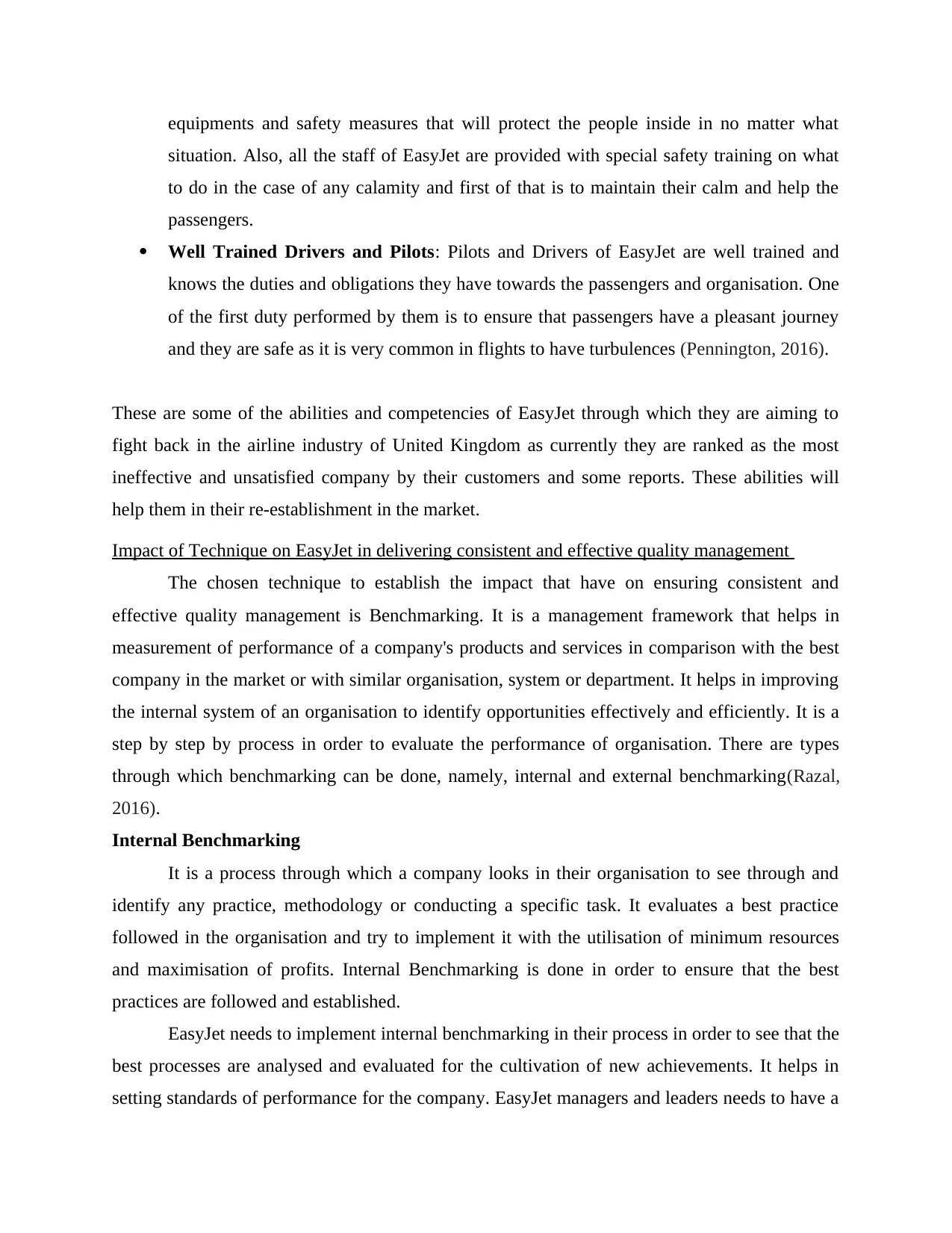
equipments and safety measures that will protect the people inside in no matter what
situation. Also, all the staff of EasyJet are provided with special safety training on what
to do in the case of any calamity and first of that is to maintain their calm and help the
passengers.
Well Trained Drivers and Pilots: Pilots and Drivers of EasyJet are well trained and
knows the duties and obligations they have towards the passengers and organisation. One
of the first duty performed by them is to ensure that passengers have a pleasant journey
and they are safe as it is very common in flights to have turbulences (Pennington, 2016).
These are some of the abilities and competencies of EasyJet through which they are aiming to
fight back in the airline industry of United Kingdom as currently they are ranked as the most
ineffective and unsatisfied company by their customers and some reports. These abilities will
help them in their re-establishment in the market.
Impact of Technique on EasyJet in delivering consistent and effective quality management
The chosen technique to establish the impact that have on ensuring consistent and
effective quality management is Benchmarking. It is a management framework that helps in
measurement of performance of a company's products and services in comparison with the best
company in the market or with similar organisation, system or department. It helps in improving
the internal system of an organisation to identify opportunities effectively and efficiently. It is a
step by step by process in order to evaluate the performance of organisation. There are types
through which benchmarking can be done, namely, internal and external benchmarking(Razal,
2016).
Internal Benchmarking
It is a process through which a company looks in their organisation to see through and
identify any practice, methodology or conducting a specific task. It evaluates a best practice
followed in the organisation and try to implement it with the utilisation of minimum resources
and maximisation of profits. Internal Benchmarking is done in order to ensure that the best
practices are followed and established.
EasyJet needs to implement internal benchmarking in their process in order to see that the
best processes are analysed and evaluated for the cultivation of new achievements. It helps in
setting standards of performance for the company. EasyJet managers and leaders needs to have a
situation. Also, all the staff of EasyJet are provided with special safety training on what
to do in the case of any calamity and first of that is to maintain their calm and help the
passengers.
Well Trained Drivers and Pilots: Pilots and Drivers of EasyJet are well trained and
knows the duties and obligations they have towards the passengers and organisation. One
of the first duty performed by them is to ensure that passengers have a pleasant journey
and they are safe as it is very common in flights to have turbulences (Pennington, 2016).
These are some of the abilities and competencies of EasyJet through which they are aiming to
fight back in the airline industry of United Kingdom as currently they are ranked as the most
ineffective and unsatisfied company by their customers and some reports. These abilities will
help them in their re-establishment in the market.
Impact of Technique on EasyJet in delivering consistent and effective quality management
The chosen technique to establish the impact that have on ensuring consistent and
effective quality management is Benchmarking. It is a management framework that helps in
measurement of performance of a company's products and services in comparison with the best
company in the market or with similar organisation, system or department. It helps in improving
the internal system of an organisation to identify opportunities effectively and efficiently. It is a
step by step by process in order to evaluate the performance of organisation. There are types
through which benchmarking can be done, namely, internal and external benchmarking(Razal,
2016).
Internal Benchmarking
It is a process through which a company looks in their organisation to see through and
identify any practice, methodology or conducting a specific task. It evaluates a best practice
followed in the organisation and try to implement it with the utilisation of minimum resources
and maximisation of profits. Internal Benchmarking is done in order to ensure that the best
practices are followed and established.
EasyJet needs to implement internal benchmarking in their process in order to see that the
best processes are analysed and evaluated for the cultivation of new achievements. It helps in
setting standards of performance for the company. EasyJet managers and leaders needs to have a
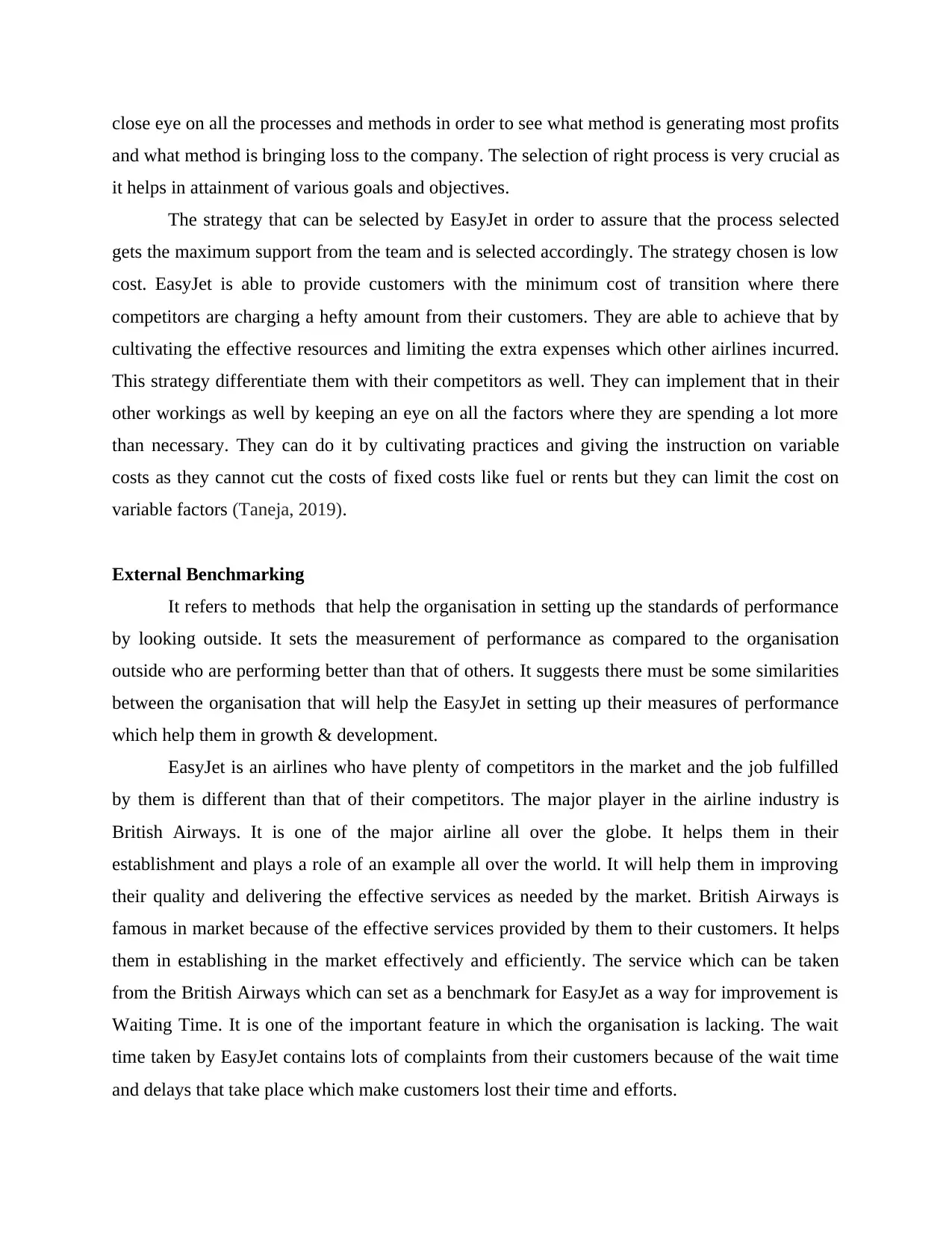
close eye on all the processes and methods in order to see what method is generating most profits
and what method is bringing loss to the company. The selection of right process is very crucial as
it helps in attainment of various goals and objectives.
The strategy that can be selected by EasyJet in order to assure that the process selected
gets the maximum support from the team and is selected accordingly. The strategy chosen is low
cost. EasyJet is able to provide customers with the minimum cost of transition where there
competitors are charging a hefty amount from their customers. They are able to achieve that by
cultivating the effective resources and limiting the extra expenses which other airlines incurred.
This strategy differentiate them with their competitors as well. They can implement that in their
other workings as well by keeping an eye on all the factors where they are spending a lot more
than necessary. They can do it by cultivating practices and giving the instruction on variable
costs as they cannot cut the costs of fixed costs like fuel or rents but they can limit the cost on
variable factors (Taneja, 2019).
External Benchmarking
It refers to methods that help the organisation in setting up the standards of performance
by looking outside. It sets the measurement of performance as compared to the organisation
outside who are performing better than that of others. It suggests there must be some similarities
between the organisation that will help the EasyJet in setting up their measures of performance
which help them in growth & development.
EasyJet is an airlines who have plenty of competitors in the market and the job fulfilled
by them is different than that of their competitors. The major player in the airline industry is
British Airways. It is one of the major airline all over the globe. It helps them in their
establishment and plays a role of an example all over the world. It will help them in improving
their quality and delivering the effective services as needed by the market. British Airways is
famous in market because of the effective services provided by them to their customers. It helps
them in establishing in the market effectively and efficiently. The service which can be taken
from the British Airways which can set as a benchmark for EasyJet as a way for improvement is
Waiting Time. It is one of the important feature in which the organisation is lacking. The wait
time taken by EasyJet contains lots of complaints from their customers because of the wait time
and delays that take place which make customers lost their time and efforts.
and what method is bringing loss to the company. The selection of right process is very crucial as
it helps in attainment of various goals and objectives.
The strategy that can be selected by EasyJet in order to assure that the process selected
gets the maximum support from the team and is selected accordingly. The strategy chosen is low
cost. EasyJet is able to provide customers with the minimum cost of transition where there
competitors are charging a hefty amount from their customers. They are able to achieve that by
cultivating the effective resources and limiting the extra expenses which other airlines incurred.
This strategy differentiate them with their competitors as well. They can implement that in their
other workings as well by keeping an eye on all the factors where they are spending a lot more
than necessary. They can do it by cultivating practices and giving the instruction on variable
costs as they cannot cut the costs of fixed costs like fuel or rents but they can limit the cost on
variable factors (Taneja, 2019).
External Benchmarking
It refers to methods that help the organisation in setting up the standards of performance
by looking outside. It sets the measurement of performance as compared to the organisation
outside who are performing better than that of others. It suggests there must be some similarities
between the organisation that will help the EasyJet in setting up their measures of performance
which help them in growth & development.
EasyJet is an airlines who have plenty of competitors in the market and the job fulfilled
by them is different than that of their competitors. The major player in the airline industry is
British Airways. It is one of the major airline all over the globe. It helps them in their
establishment and plays a role of an example all over the world. It will help them in improving
their quality and delivering the effective services as needed by the market. British Airways is
famous in market because of the effective services provided by them to their customers. It helps
them in establishing in the market effectively and efficiently. The service which can be taken
from the British Airways which can set as a benchmark for EasyJet as a way for improvement is
Waiting Time. It is one of the important feature in which the organisation is lacking. The wait
time taken by EasyJet contains lots of complaints from their customers because of the wait time
and delays that take place which make customers lost their time and efforts.
⊘ This is a preview!⊘
Do you want full access?
Subscribe today to unlock all pages.

Trusted by 1+ million students worldwide
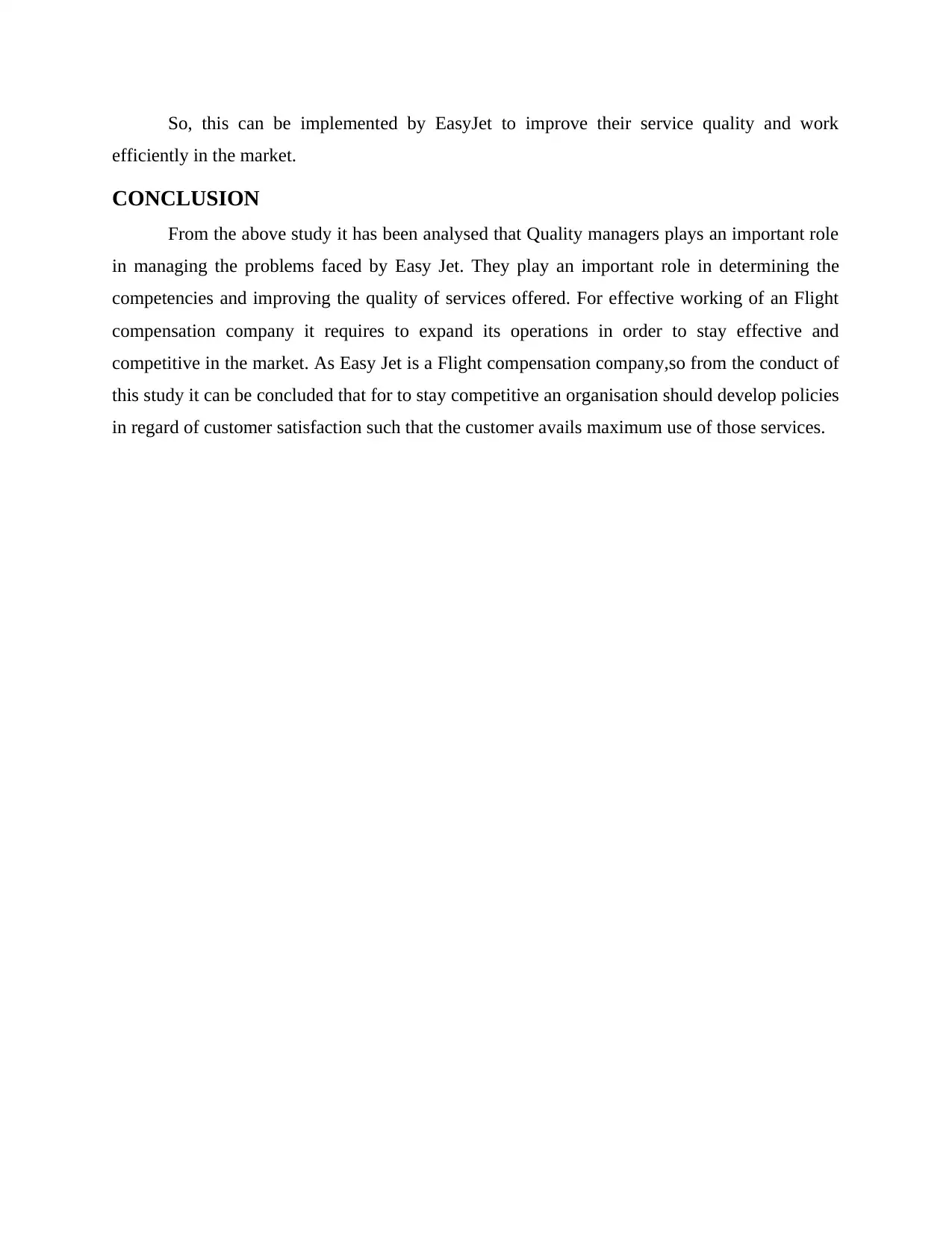
So, this can be implemented by EasyJet to improve their service quality and work
efficiently in the market.
CONCLUSION
From the above study it has been analysed that Quality managers plays an important role
in managing the problems faced by Easy Jet. They play an important role in determining the
competencies and improving the quality of services offered. For effective working of an Flight
compensation company it requires to expand its operations in order to stay effective and
competitive in the market. As Easy Jet is a Flight compensation company,so from the conduct of
this study it can be concluded that for to stay competitive an organisation should develop policies
in regard of customer satisfaction such that the customer avails maximum use of those services.
efficiently in the market.
CONCLUSION
From the above study it has been analysed that Quality managers plays an important role
in managing the problems faced by Easy Jet. They play an important role in determining the
competencies and improving the quality of services offered. For effective working of an Flight
compensation company it requires to expand its operations in order to stay effective and
competitive in the market. As Easy Jet is a Flight compensation company,so from the conduct of
this study it can be concluded that for to stay competitive an organisation should develop policies
in regard of customer satisfaction such that the customer avails maximum use of those services.
Paraphrase This Document
Need a fresh take? Get an instant paraphrase of this document with our AI Paraphraser
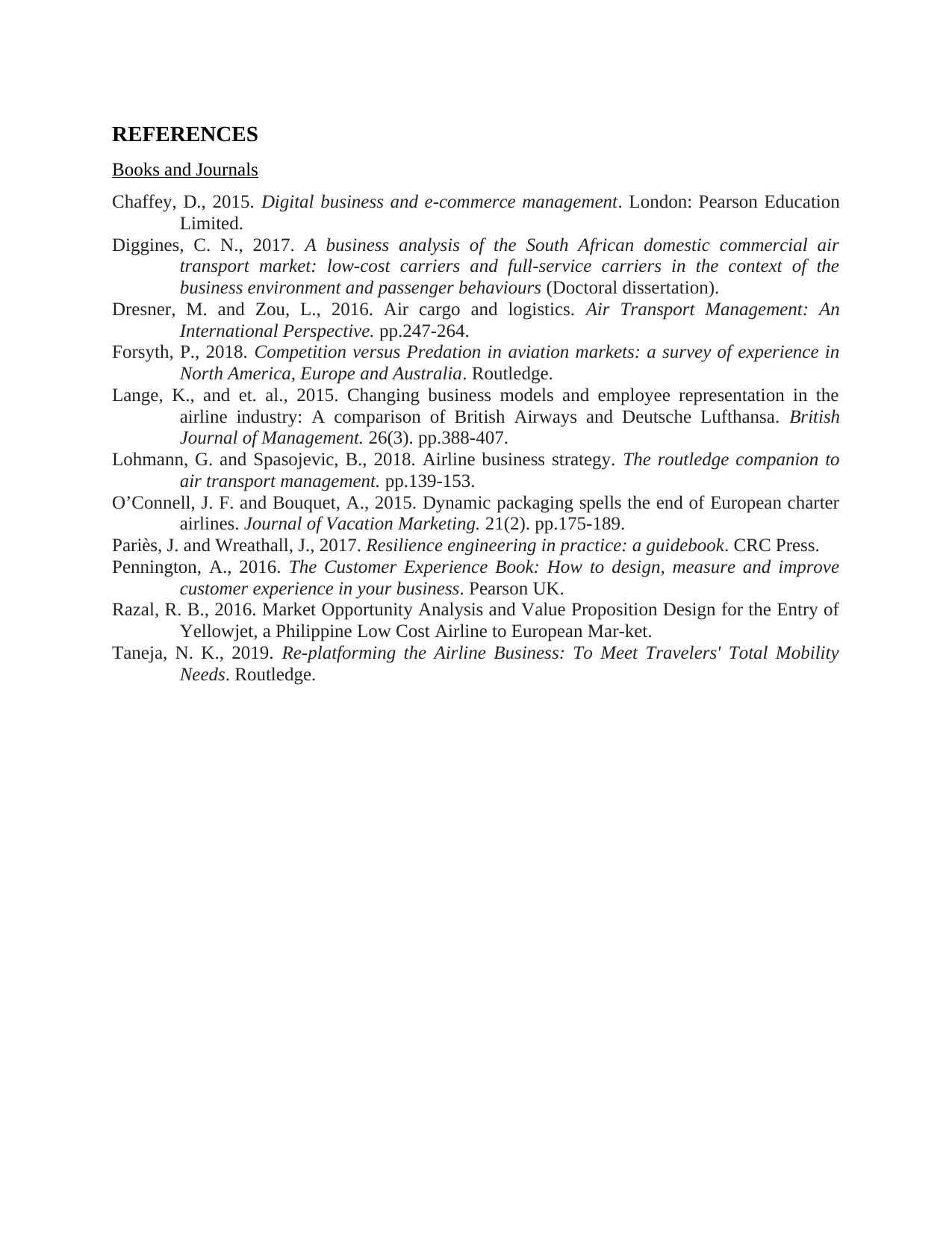
REFERENCES
Books and Journals
Chaffey, D., 2015. Digital business and e-commerce management. London: Pearson Education
Limited.
Diggines, C. N., 2017. A business analysis of the South African domestic commercial air
transport market: low-cost carriers and full-service carriers in the context of the
business environment and passenger behaviours (Doctoral dissertation).
Dresner, M. and Zou, L., 2016. Air cargo and logistics. Air Transport Management: An
International Perspective. pp.247-264.
Forsyth, P., 2018. Competition versus Predation in aviation markets: a survey of experience in
North America, Europe and Australia. Routledge.
Lange, K., and et. al., 2015. Changing business models and employee representation in the
airline industry: A comparison of British Airways and Deutsche Lufthansa. British
Journal of Management. 26(3). pp.388-407.
Lohmann, G. and Spasojevic, B., 2018. Airline business strategy. The routledge companion to
air transport management. pp.139-153.
O’Connell, J. F. and Bouquet, A., 2015. Dynamic packaging spells the end of European charter
airlines. Journal of Vacation Marketing. 21(2). pp.175-189.
Pariès, J. and Wreathall, J., 2017. Resilience engineering in practice: a guidebook. CRC Press.
Pennington, A., 2016. The Customer Experience Book: How to design, measure and improve
customer experience in your business. Pearson UK.
Razal, R. B., 2016. Market Opportunity Analysis and Value Proposition Design for the Entry of
Yellowjet, a Philippine Low Cost Airline to European Mar-ket.
Taneja, N. K., 2019. Re-platforming the Airline Business: To Meet Travelers' Total Mobility
Needs. Routledge.
Books and Journals
Chaffey, D., 2015. Digital business and e-commerce management. London: Pearson Education
Limited.
Diggines, C. N., 2017. A business analysis of the South African domestic commercial air
transport market: low-cost carriers and full-service carriers in the context of the
business environment and passenger behaviours (Doctoral dissertation).
Dresner, M. and Zou, L., 2016. Air cargo and logistics. Air Transport Management: An
International Perspective. pp.247-264.
Forsyth, P., 2018. Competition versus Predation in aviation markets: a survey of experience in
North America, Europe and Australia. Routledge.
Lange, K., and et. al., 2015. Changing business models and employee representation in the
airline industry: A comparison of British Airways and Deutsche Lufthansa. British
Journal of Management. 26(3). pp.388-407.
Lohmann, G. and Spasojevic, B., 2018. Airline business strategy. The routledge companion to
air transport management. pp.139-153.
O’Connell, J. F. and Bouquet, A., 2015. Dynamic packaging spells the end of European charter
airlines. Journal of Vacation Marketing. 21(2). pp.175-189.
Pariès, J. and Wreathall, J., 2017. Resilience engineering in practice: a guidebook. CRC Press.
Pennington, A., 2016. The Customer Experience Book: How to design, measure and improve
customer experience in your business. Pearson UK.
Razal, R. B., 2016. Market Opportunity Analysis and Value Proposition Design for the Entry of
Yellowjet, a Philippine Low Cost Airline to European Mar-ket.
Taneja, N. K., 2019. Re-platforming the Airline Business: To Meet Travelers' Total Mobility
Needs. Routledge.
1 out of 11
Related Documents
Your All-in-One AI-Powered Toolkit for Academic Success.
+13062052269
info@desklib.com
Available 24*7 on WhatsApp / Email
![[object Object]](/_next/static/media/star-bottom.7253800d.svg)
Unlock your academic potential
Copyright © 2020–2026 A2Z Services. All Rights Reserved. Developed and managed by ZUCOL.



